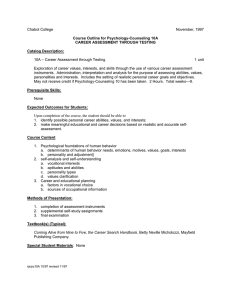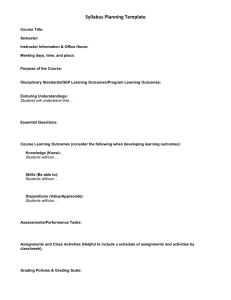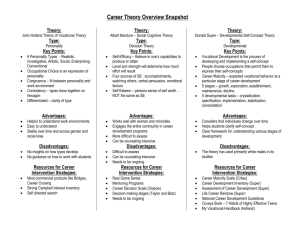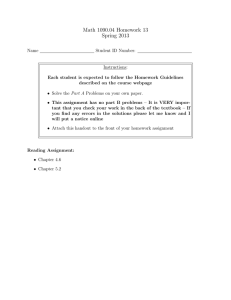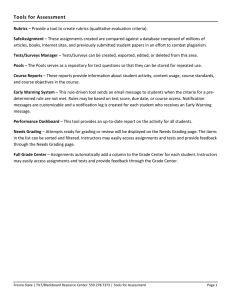College of San Mateo Course Outline
advertisement
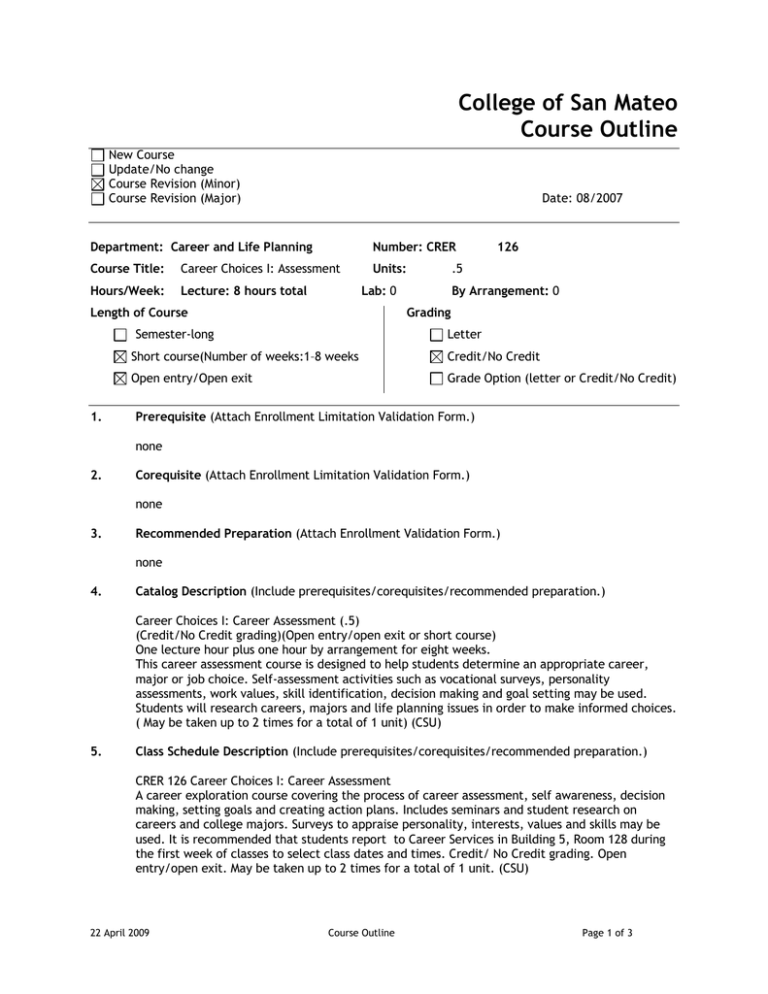
College of San Mateo Course Outline New Course Update/No change Course Revision (Minor) Course Revision (Major) Date: 08/2007 Department: Career and Life Planning Number: CRER Course Title: Career Choices I: Assessment Units: Hours/Week: Lecture: 8 hours total By Arrangement: 0 Grading Semester-long 1. .5 Lab: 0 Length of Course 126 Letter Short course(Number of weeks:1–8 weeks Credit/No Credit Open entry/Open exit Grade Option (letter or Credit/No Credit) Prerequisite (Attach Enrollment Limitation Validation Form.) none 2. Corequisite (Attach Enrollment Limitation Validation Form.) none 3. Recommended Preparation (Attach Enrollment Validation Form.) none 4. Catalog Description (Include prerequisites/corequisites/recommended preparation.) Career Choices I: Career Assessment (.5) (Credit/No Credit grading)(Open entry/open exit or short course) One lecture hour plus one hour by arrangement for eight weeks. This career assessment course is designed to help students determine an appropriate career, major or job choice. Self-assessment activities such as vocational surveys, personality assessments, work values, skill identification, decision making and goal setting may be used. Students will research careers, majors and life planning issues in order to make informed choices. ( May be taken up to 2 times for a total of 1 unit) (CSU) 5. Class Schedule Description (Include prerequisites/corequisites/recommended preparation.) CRER 126 Career Choices I: Career Assessment A career exploration course covering the process of career assessment, self awareness, decision making, setting goals and creating action plans. Includes seminars and student research on careers and college majors. Surveys to appraise personality, interests, values and skills may be used. It is recommended that students report to Career Services in Building 5, Room 128 during the first week of classes to select class dates and times. Credit/ No Credit grading. Open entry/open exit. May be taken up to 2 times for a total of 1 unit. (CSU) 22 April 2009 Course Outline Page 1 of 3 6. Course Outcomes (Identify 5-8 expected learner outcomes using active verbs.) Upon completion of the course, students wil be able to: - Define the steps in the career decision making process - Identify the appropriate starting point for his/her career decision making process - Use a selection of vocational surveys to help determine choice - Use self-reflection techniques to help validate career and educational choice - Integrate vocational/skill assessment results into potential decision - Set short term educational goals - Evaluate short term goals - Employ action plan strategies - Use Counseling Services effectively - Write Student Educational Plan for dicscussion with counselor 7. Course Content (Brief but complete topical outline of the course that includes major subject areas [1-2 pages]. Should reflect all course objectives listed above. In addition, you may attach a sample course syllabus with a timeline.) a. Making choices: An introduction to the career decision making process b. Self-discovery: Reflection on your goals, mission, passion or purpose in life c. How your preferences reflect your personality: Using the MBTI and other personality surveys d. How your vocational interests patterns reflect your choices: Using the Strong Interest Inventory e. Discovering your work values: Using values assessment tools f. Identifying your transferable and personal skills: Using life experience interviews and skill assessments g. Integrating your career assessment results: Analyzing data to make a tentative career or educational choice h. Practice setting personal goals: Using goal setting strategies that best match your personality i. How to write your educational plan: Using college catalog, GE lists and other advising tools j. Evaluate your plan: Using self-reflection and research skills to clarify and validate your decisions k. Prepare for your counseling meeting: Presenting your educational goals and asking for feedback 22 April 2009 Course Outline Page 2 of 3 8. Representative Instructional Methods (Describe instructor-initiated teaching strategies that will assist students in meeting course objectives. Include examples of out-of-class assignments, required reading and writing assignments, and methods for teaching critical thinking skills.) Instructional methods include but are not limited to, short lectures, required readings, vocational assessments, classroom exercises, student discussions, and writing assignments. Students will be asked to apply new learning and decision-making strategies to class assignments and to articulate potential career, major or job choice. 9. Representative Methods of Evaluation (Describe measurement of student progress toward course objectives. Courses with required writing component and/or problem-solving emphasis must reflect critical thinking component. If skills class, then applied skills.) Students will write self-reflection papers or notes, discuss the assessment results, articulate a decision-making process and write short-term goals including a tentative student educational and career plan. 10. Representative Text Materials (With few exceptions, texts need to be current. Include publication dates.) This is a .5 unit course, conducted over 8 hours of class/counseling time. A selected compendium of handouts, assessment tools, readings and exercises will be used. Internet sites such as Eureka and Assist will be provided. Supplemental texts: The Career Fitness Program: Exercising Your Options; Diane Sukiennik, William Bendat, Lisa Raufman, (2001) sixth edition, Prentice Hall Vocational Assessment instruments: Strong Interest Inventory Myers- Briggs Type Indicator Value Card Sorts Skills Card Sorts Available through Consulting Psychologist Press On-line through Skills-One, a CPP web-site Prepared by: (Signature) Email address: burnse@smccd.net Submission Date: 02-27-05 UPDATED 08/2007 22 April 2009 Course Outline Page 3 of 3

